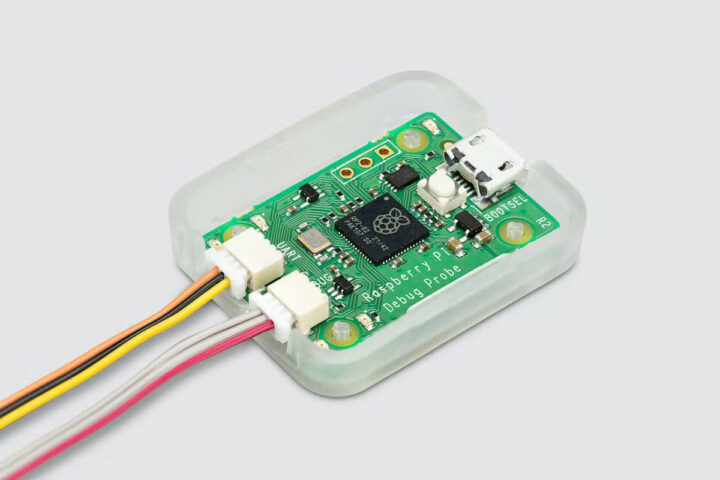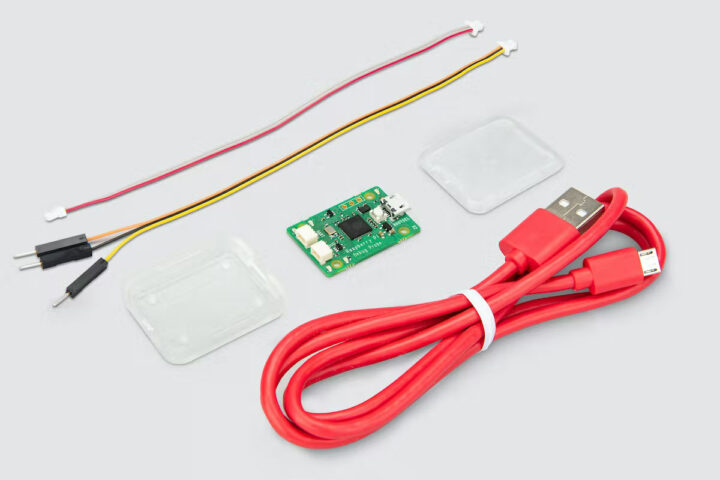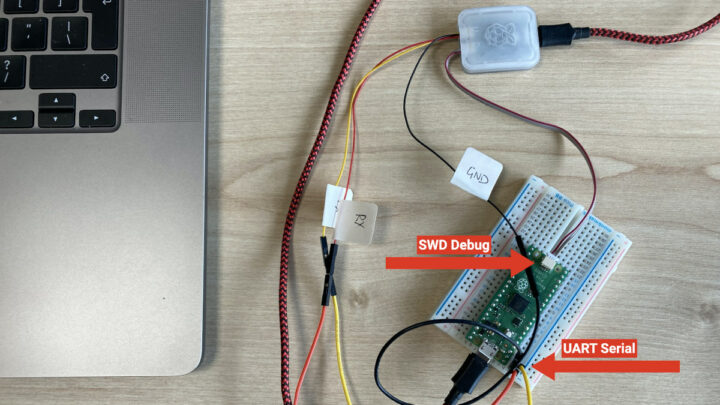The Raspberry Pi Debug Probe is a USB serial adapter based on the Raspberry Pi RP2040 microcontroller and designed to debug the Raspberry Pi Pico, third-party RP2040 boards, and pretty much any Arm board through SWD and/or UART interfaces.
The main advantage over a typical USB-to-serial adapter is the presence of a Serial Wire Debug (SWD) bridge used for bare metal code development and debugging through tools such as OpenOCD.
The Raspberry Pi Debug Probe specifications:
- MCU – Raspberry Pi RP2040 dual-core Cortex-M0+ microcontroller @ 133 MHz with 264KB SRAM
- Storage – 2MB SPI flash (W25Q16JVUXIQ)
- Debug interfaces
- 3.3V Serial Wire Debug (SWD) 3-pin JST connector conforming to the Raspberry Pi Debug Connector Specification and compatible with the CMSIS-DAP standard
- 3.3V serial (UART) 3-pin JST connector
- USB – Micro USB port to connect to the host
- Misc
- BOOTSEL button for flashing firmware to the debug board
- Unpopulated 3-pin header with GPIO0, GPIO1, GND
- Green (GPIO15/7) and yellow (GPIO16/8) LEDs
The Debug Probe does not come alone and is accompanied by a plastic enclosure, debug cables, and a micro USB cable. The new board does not actually bring anything to the table except for simplicity/ease-of-use since it’s also possible to use a Raspberry Pi Pico or other RP2040 board to act as a USB to SWD/UART bridge using PicoProbe firmware. You would save time with the Debug Prove since cabling is much easier, and no soldering is required. Raspberry Pi also wrote documentation showing how to use the Raspberry Pi Debug Probe with OpenOCD and the GNU debugger (GDB) on Linux or Raspberry Pi, Windows, and macOS.
The company also says the Debug Probe provides an alternative to other USB serial adapters for those not using SWD, but considering those can be purchased for $1 to $2, the value proposition for this specific use case may not be there…
The Raspberry Pi Debug Probe is available now for $12 plus taxes and shipping from your preferred distributor.
Via the Raspberry Pi Blog.

Jean-Luc started CNX Software in 2010 as a part-time endeavor, before quitting his job as a software engineering manager, and starting to write daily news, and reviews full time later in 2011.
Support CNX Software! Donate via cryptocurrencies, become a Patron on Patreon, or purchase goods on Amazon or Aliexpress








This just makes me think that since RP2040 has native USB and can thus implement high speed UARTs, it could be a nice option to build a refreshed buspirate board, ideally with the exact same protocol so that existing software doesn’t have to be updated (e.g. openocd, avrdude, flashrom etc).
That sounds like a pretty good idea! And the PIO could be used to add additional protocols, like e.g. WS2812, etc
“implement high speed UARTs”
How fast?
This seems to be a Pico with two JST headers instead of the pin-headers. I don’t see too much benefit over using the Pico I have in my drawer anyways. Would have been cool to have level shifters on there, similar to what we did on our Riotee probe: https://github.com/NessieCircuits/Riotee_ProbeHardware
Relaying what I heard on the Ox64 chat: “A second serial port would be nice.” “Why not just use any old *pill board running BMP?” Generally the opinion was that it needs to work with existing debug/programming software like Willy says.
Any idea if it’s possible to use this Pi Debug Probe on other devices (STM32, SmartFusion2) that support SWD / OpenOCD?
Yes, it works with other Arm boards as well.